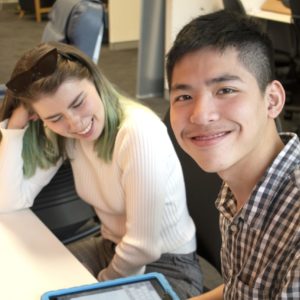 You’re about to finish school and move into your adult life! The world is full of new possibilities.
You’re about to finish school and move into your adult life! The world is full of new possibilities.
This can be an exciting time. If you have a disability, these changes can also cause anxiety as your options are not always clear. You may have questions about what to do next.
To help you decide on a future that’s best for you, we’ve put together a simple guide of different post school options.
Your options for work and skill development
The chance to do meaningful work, grow talents and live a life of purpose are aspirations you might have for life after school. The list below includes options you could choose from.
- Further education or training
- Day programs
- Community day centres
- Supported employment
- Open employment
- Volunteering
Further education or training
There are many post-school education and training options that can suit school leavers who have a disability, including:
- University – a higher education and research institution granting academic degrees in many subjects
- TAFE – an Australia-wide organisation providing vocational education and training
- Vocational Education and Training (VET) – offering skills and training for specific jobs and industries
- Registered Training Organisations (RTO) – delivering VET programs with the Australian Skills Quality Authority
- Apprenticeships/Traineeships – providing qualifications through on-the-job training with an employer and classroom-based learning.
Day programs
Day programs have a recreational focus. They can be a great fit for many young people with a disability with high support needs. They provide opportunities to participate in the community or focus on independent life skills.
Day programs are run by disability service providers and community organisations. You might go to a centre each week or do the activities out in the community.
In the past few years exciting new day program options have emerged. Avenue isn’t your typical day program. With Avenue, you come in and complete real work tasks by joining microbusinesses that operate in a supported environment. They are driven by the belief that everyone can make a productive contribution and fully take part in society. So even if you don’t have a goal of open employment, you can still access meaningful and purpose-driven work, and share in the profits.
NDIS participants can use Assistance with Social and Community Participation (Core) and/or Increased Social and Community Participation (Capacity Building) funding to attend Avenue. Free support to individuals to apply for the NDIS is also available at Avenue if required.
Community day centres
Community day centres are places you can go to participate in fun and interesting group social activities like music or sport.
One option is the less traditional Avenue Social. What makes Avenue different is their commitment to designing a varied social calendar according to participants’ interests and input, as well as supporting participants to develop their skills and integrating learning into the social activities. Some of the skills participants build on include independence, confidence, money-handling, communication, and road safety awareness.
Supported employment
Supported employment is a job where a person with a disability gets assistance to do the work, learn new skills and set goals.
This type of job is usually through Australian Disability Enterprises (ADE). They are businesses designed to provide employment to people with disability. This employment is not paid at award-wage and is not mainstream (all your colleagues will have a disability).
Open employment
Open employment is also called mainstream employment. It is where people with and without disability do their jobs together in the same workplace.
One pathway to open employment is to use a Disability Employment Service (DES). You can get help to apply for jobs and find work.
But if you want to build up your job-ready skills and confidence before applying to jobs, you may want to start with a work-readiness training pathway. In your last year of school, or when you leave, you can do this with School Leaver Employment Support (SLES) using your NDIS plan. SLES providers like Avenue’s sister enterprise Jigsaw can provide work experience, mentoring, on-the-job training, and help with your job search.
Community or volunteer work
Volunteering means giving your time freely to help a person, cause, or group. It’s an excellent way to expose yourself to new challenges, and gain job skills and work experience. It can even increase your well-being and reduce stress and loneliness.
So many organisations rely on help from volunteers. It might be an animal welfare group, op shop, charity or community organisation like Meals on Wheels.
And you don’t have to go it alone. If you feel you’d like support to volunteer, you can apply for an NDIS-funded support worker through a package called Core funding, under the category of ‘Assistance with social and community participation’.